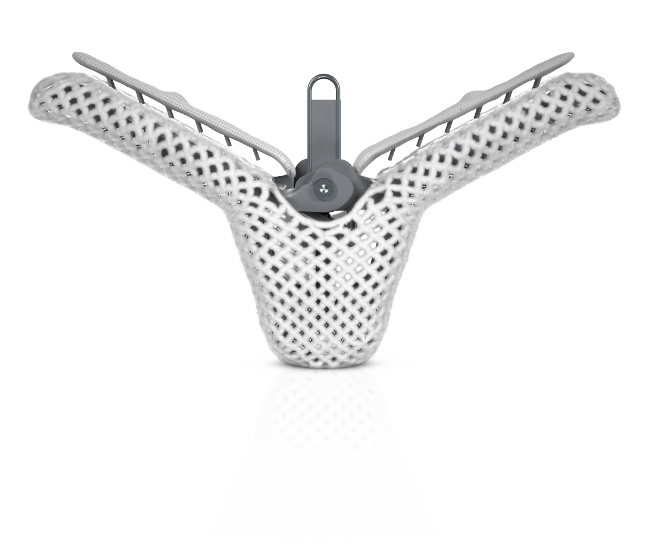MitraClip™ is the only device shown to improve survival of heart failure (hf) patients with secondary MITRAL REGURGITATION (SMR)1

Watch the highlights
of the COAPT™ trial
MitraClip met all primary endpoints in the COAPT Trial1
MitraClip met all primary endpoints in the COAPT Trial1
All secondary effectiveness endpoints are powered for superiority of the device group compared with the control group; the secondary safety endpoint of all-cause mortality at 12 months is powered for noninferiority of the device group compared with the control group; the secondary composite safety endpoint all-cause death, stroke, MI, or non-elective (urgent or emergent) cardiovascular surgery for device-related complications at 30 days is powered for noninferiority of the device group compared to a prespecified objective performance goal.
3-year data from the COAPT trial2
MitraClip save lives at year 32
MitraClip reduces hospitalizations at year 32
Includes crossover patients (guideline-directed medical therapy [GDMT] only patients that were allowed to cross over to MitraClip after 24 months).
MitraClip changes the course in patients’ quality of life3
Note: Kansas City Cardiomyopathy Questionnaire (KCCQ) Minimum for Clinically Important Difference (MCID)=5 points; Large Improvement Defined as ≥20 Points in KCCQ from Baseline; quality of life is assessed only in surviving patients.
A multicenter, randomized, controlled, parallel-group, open-label trial of transcatheter mitral valve repair (TMVr)* with the MitraClip device was conducted in symptomatic patients with heart failure and moderate-to-severe (grade 3+) or severe (grade 4+) secondary MR. Patients were randomized 1:1 to undergo TMVr with MitraClip and receive GDMT (n=302) or GDMT alone (n=312).1
*TMVr is now also referred to as TEER (transcatheter edge-to-edge repair)
MAT-2410455 v2.0 | Item approved for U.S. use only
- Stone GW, Lindenfeld J, Abraham WT, et al. Transcatheter mitral-valve repair in patients with heart failure. N Engl J Med. 2018;379(24):2307-2318.
- Mack M. COAPT: 3-Year Outcomes of Transcatheter Mitral Valve Repair in Patients with Heart Failure. JACC Mar 2021.
- Arnold SV, Chinnakondepalli KM, Spertus JA, et al. Health status after transcatheter mitral valve repair in heart failure and secondary mitral regurgitation. COAPT Trial. J Am Coll Cardiol. 2019;73(17):2123-2132.
REQUEST AN ABBOTT REP
Rx Only
Important Safety Information
MITRACLIP™ CLIP DELIVERY SYSTEM
- The MitraClip™ G4 System is indicated for the percutaneous reduction of significant symptomatic mitral regurgitation (MR ≥ 3+) due to primary abnormality of the mitral apparatus [degenerative MR] in patients who have been determined to be at prohibitive risk for mitral valve surgery by a heart team, which includes a cardiac surgeon experienced in mitral valve surgery and a cardiologist experienced in mitral valve disease, and in whom existing comorbidities would not preclude the expected benefit from reduction of the mitral regurgitation.
- The MitraClip™ G4 System, when used with maximally tolerated guideline-directed medical therapy (GDMT), is indicated for the treatment of symptomatic, moderate-to-severe or severe secondary (or functional) mitral regurgitation (MR; MR ≥ Grade III per American Society of Echocardiography criteria) in patients with a left ventricular ejection fraction (LVEF) ≥ 20% and ≤ 50%, and a left ventricular end systolic dimension (LVESD) ≤ 70 mm whose symptoms and MR severity persist despite maximally tolerated GDMT as determined by a multidisciplinary heart team experienced in the evaluation and treatment of heart failure and mitral valve disease.
Contraindications
The MitraClip G4 System is contraindicated in patients with the following conditions: Patients who cannot tolerate, including allergy or hypersensitivity to, procedural anticoagulation or post procedural anti-platelet regime; Patients with known hypersensitivity to clip components (nickel / titanium, cobalt, chromium, polyester), or with contrast sensitivity; Active endocarditis of the mitral valve; Rheumatic mitral valve disease; Evidence of intracardiac, inferior vena cava (IVC) or femoral venous thrombus.
Potential Complications and Adverse Events
The following ANTICIPATED EVENTS have been identified as possible complications of the MitraClip G4 procedure: Allergic reactions or hypersensitivity to latex, contrast agent, anaesthesia, device materials (nickel / titanium, cobalt, chromium, polyester), and drug reactions to anticoagulation, or antiplatelet drugs, Vascular access complications which may require transfusion or vessel repair including: wound dehiscence, catheter site reactions, Bleeding (including ecchymosis, oozing, hematoma, hemorrhage, retroperitoneal hemorrhage), Arteriovenous fistula, pseudoaneurysm, aneurysm, dissection, perforation / rupture, vascular occlusion, Emboli (air thrombotic material, implant, device component); Peripheral Nerve Injury; Lymphatic complications; Pericardial complications which may require additional intervention, including: Pericardial effuse on, Cardiac tamponade, Pericarditis; Cardiac complications which may require additional interventions or emergency cardiac surgery, including: Cardiac perforation, Atrial septal defect; Mitral valve complications, which may complicate or prevent later surgical repair, including: Chordal entanglement / rupture, Single Leaflet Device Attachment (SLDA), Thrombosis, Dislodgement of previously implanted devices, Tissue damage, Mitral valve stenosis, Persistent or residual mitral regurgitation, Endocarditis; Cardiac arrhythmias (including conduction disorders, atrial arrhythmias, ventricular arrhythmias); Cardiac ischemic conditions (including myocardial infarction, myocardial ischemia, and unstable / stable angina); Venous thromboembolism (including deep vein thrombosis, pulmonary embolism, post procedure pulmonary embolism); Stroke / Cerebrovascular accident (CVA) and Transient Ischemic Attack (TIA); System organ failure: Cardio-respiratory arrest, Worsening heart failure, Pulmonary congestion, Respiratory dysfunction / failure / atelectasis, Renal insufficiency or failure, Shock (including cardiogenic and anaphylactic); Blood cell disorders (including coagulopathy, hemolysis, and Heparin Induced Thrombocytopenia (HIT)); Hypotension / hypertension; Infection including: Urinary Tract Infection (UTI), Pneumonia, Septicemia; Nausea / vomiting; Chest pain; Dyspnea; Edema; Fever or hyperthermia; Pain; Death; Fluoroscopy, Transesophageal echocardiogram (TEE) and Transthoracic echocardiogram (TTE) -related complications: Skin injury or tissue changes due to exposure to ionizing radiation, Esophageal irritation; Esophageal perforation, Gastrointestinal bleeding.
